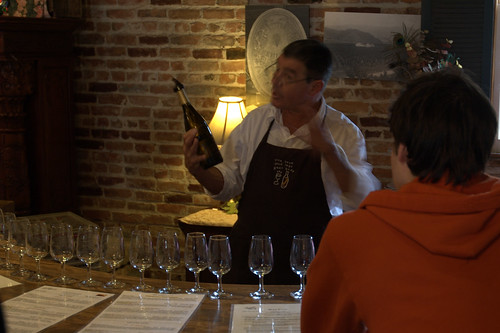Today in my advanced physics lab, professor Kirkby discussed the importance of unbiased data analysis. In particular, he talked about how scientists can use a chi-squared test as a way to objectively assess the validity of one's error bars. That got me thinking about bias in the food industry.
Just last weekend, I went wine tasting in the Santa Cruz mountains, as part of a visit to Palo Alto. I was surprised by how reasonable the tasting was. Picchetti (above) winery offered 5 1oz tastes for only $5 dollars. The cheapest bottle of table wine was $21, but the price of tasting is refunded if you buy anything.
Our host - pictured above, teaching us how to taste wine - described the history of wine in California. In particular, he recounted a 1976 wine competition later known as The Judgement of Paris. It was one of the first blind-wine-tasting competitions in which California wines were invited - before that, France was neck-deep in its own pride to take them seriously (as a French citizen, I can say this). Beyond anyone's expectations, the American wines snagged first place in a significant number of categories. The results and ensuing controversy/embarrassment sparked and fueled the wine industry in California.
Though there is no doubt that Californian wines have merit, it's interesting to note that the results of the competition were disputed for a few years. Sure - these were motivated by nationalist interests, but they were not mathematically unfounded. Specifically, the Judgement of Paris competition only had about 10 judges with no common grading rubric. The resulting scores for each wine had huge deviations among the tasters. In the end, only two of the average wine scores could be identified as statistically significantly successful. In other words, the other wines were statistically indistinguishable (their error bars overlapped).
Since, the controversy has calmed, and the Judgement ultimately improved the quality (and quantity) of wine in both Europe and America. (Cool fact: Forbidden Wine is wine produced in Islamic countries, where alcohol is not religiously allowed. For example, Morroco makes about 40,000 bottles of wine a year. The majority is not exported).
It seems unbelievably appropriate, now, to bring up another French-California food topic that has recently grown in controversy! That's right - Foie Gras - literally "fatty liver" in French - is pureed liver of duck or goose. The fowl are force fed, and animal rights activists recently successfully introduced a law in California banning the production and sale of foie gras. (I wont go into this today, but I think the process is no less cruel that the conditions subjected to all other conventionally raised cattle. Stay tuned for a post about a field trip to witness cattle butchering and gutting.)
Akin to wine tasting, a recent study asked the question: Is it Foie Gras or Dog Food? The study gave 18 people 5 different pureed meats, only one of which was dog food. Only three subjects successfully identified the dog food. The report concludes "People cannot distinguish dog food from pâté intended for human consumption". Hell, what subset of the population eats foie gras (or dog food for that matter) often enough to readily remember its taste?!
I take issue with the study on several levels, but one this is clear from all these above examples: taste is an incredibly liquid, subjective sense. Consider how much smell plays an affect on taste, especially in a small kitchen:

My kitchen is tiny. When I cook something, my nose is inundated with everything we boil and broil. (Above, Ari, Mike and Jake are making a Poor Shepard's Pie). By the time we sit down, the receptors in my nose have been saturated by the ubiquitous smell of my food, which ends up tasting bland as a result.
For a long time, I would step outside for thirty seconds before eating to try and clear my nose. These days, I employ a neat trick I learned from a friend. I don't know how it works:
Smell your skin to reset your nose.


1 comment:
I'll take dog food over pate any day. just kidding. pate is yummy. I feel like these sorts of studies happen a lot. It really does just come down to personal preference. There's no universal best (or worst?).
Post a Comment